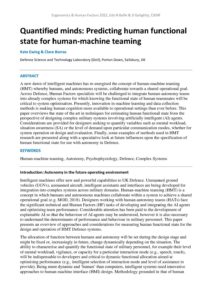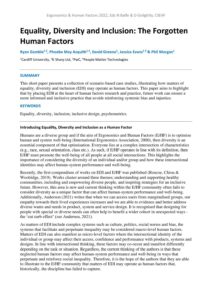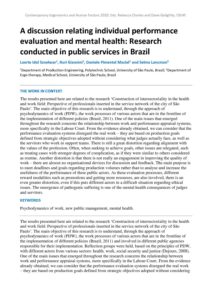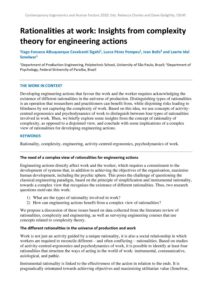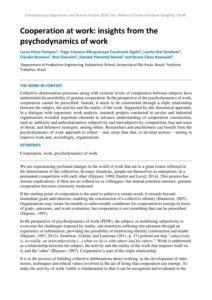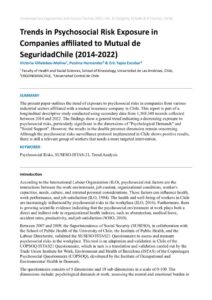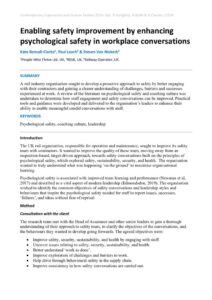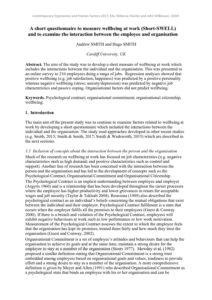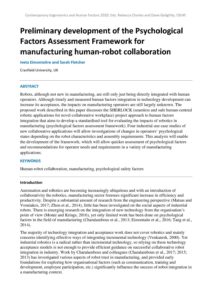Psychology
Quantified minds: Predicting human functional state for human-machine teaming
| Document | Author Kate Ewing & Clare Borras |
| Abstract A new dawn of intelligent machines has re-energised the concept of human-machine teaming (HMT) whereby humans, and autonomous systems, collaborate towards a shared operational goal. Across Defence, Human Factors specialists will be challenged to integrate human-autonomy teams into already complex systems for which knowing the functional state of human teammates will be critical to system optimisation. Presently, innovation in machine learning and data collection methods is making human cognition more available to operational settings than ever before. This paper overviews the state of the art in techniques for estimating human functional state from the perspective of designing complex military systems involving artificially intelligent (AI) agents. Considerations are provided for designers seeking to quantify variables such as mental workload, situation awareness (SA) or the level of demand upon particular communication modes, whether for system operation or design and evaluation. Finally, some examples of methods used in HMT research are presented along with a speculative look at future influences upon the specification of human functional state for use with autonomy in Defence. |
Equality, Diversity and Inclusion: The Forgotten Human Factors
| Document | Author Ryan Gamble, Phoebe May Asquith1, David Greeno, Jessica Evans & Phil Morgan |
| Abstract This short paper presents a collection of scenario-based case studies, illustrating how matters of equality, diversity and inclusion (EDI) may operate as human factors. This paper aims to highlight that by placing EDI at the heart of human factors research and practice, future work can ensure a more informed and inclusive practice that avoids reinforcing systemic bias and injustice. |
A discussion relating individual performance evaluation and mental health: Research conducted in public services in Brazil
| Document | Author Laerte Idal Sznelwar, Ruri Giannini, Daniele Pimentel Maciel and Selma Lancman |
| Abstract The results presented here are related to the research ‘Construction of intersectoriality in the health and work field: Perspective of professionals inserted in the service network of the city of São Paulo’. The main objective of this research is to understand, through the approach of psychodynamics of work (PDW), the work processes of various actors that are in the frontline of the implementation of different policies (Brasil, 2011). One of the main issues that emerged throughout the research concerns the relationship between work and performance appraisal systems, more specifically in the Labour Court. From the evidence already obtained, we can consider that the performance evaluation systems disregard the real work – they are based on production goals defined from strategic objectives adopted without considering what judges actually face, as well as the servitors who work in support teams. There is still a great distortion regarding alignment with the values of the profession. Often, when seeking to achieve goals, other issues are relegated, such as treating cases with stronger degrees of complication, as if they were similar to others considered as routine. Another distortion is that there is not really an engagement in improving the quality of work – there are almost no organisational devices for discussion and feedback. The main purpose is to meet deadlines and goals regarding production volumes rather than to analyse and increase the usefulness of the performance of these public actors. As these evaluation processes, different reward modalities such as promotions and getting more resources, are also involved, there is an even greater distortion, even if this puts different actors in a difficult situation regarding ethical issues. The emergence of pathogenic suffering is one of the mental health consequences of judges and servitors. |
Rationalities at work: Insights from complexity theory for engineering actions
| Document | Author Tiago Fonseca Albuquerque Cavalcanti Sigahi, Lucca Pérez Pompeu, Ivan Bolis and Laerte Idal Sznelwar |
| Abstract Developing engineering actions that favour the work and the worker requires acknowledging the existence of different rationalities in the universe of production. Distinguishing types of rationalities is an operation that researchers and practitioners can benefit from, while disjoining risks leading to blindness by not capturing the complexity of work. Based on this idea, we use concepts of activity-centred ergonomics and psychodynamics of work to distinguish between four types of rationalities involved in work. Then, we briefly explore some insights from the concept of rationality of complexity, as opposed to a disjointed view, and conclude with some implications of a complex view of rationalities for developing engineering actions. |
Cooperation at work: insights from the psychodynamics of work
| Document | Author Lucca Pérez Pompeu, Tiago Fonseca Albuquerque Cavalcanti Sigahi, Laerte Idal Sznelwar, Cláudio Brunoro, Ruri Giannini, Daniele Pimentel Maciel and Bruno César Kawasaki |
| Abstract Collective deterioration processes along with extreme levels of competition between subjects have undermined the possibility of genuine cooperation. In the perspective of the psychodynamics of work, cooperation cannot be prescribed: instead, it needs to be constructed through a triple relationship between the subject, the activity and the reality of the work. Supported by this theoretical approach, in a dialogue with ergonomic work analysis, research projects conducted in service and industrial organisations revealed important elements to advance understanding of cooperation construction, such as: authority and authoritarianism; subjectivity and intersubjectivity; competition; fear and sense of threat; and defensive strategies, among others. Researchers and practitioners can benefit from the psychodynamics of work approach to reflect – and, more than that, to develop actions – aiming to improve work and, accordingly, organisations. |
Trends in Psychosocial Risk Exposure in Companies affiliated to Mutual de SeguridadChile (2014-2022)
| Document | Author Victoria Villalobos-Molina, Paulina Hernandez & Eric Tapia Escobar |
| Abstract The present paper outlines the trend of exposure to psychosocial risks in companies from various industrial sectors affiliated with a mutual insurance company in Chile. This report is part of a longitudinal descriptive study conducted using secondary data from 1,568,340 records collected between 2014 and 2022. The findings show a general trend indicating a decreasing exposure to psychosocial risks, particularly significant in the dimensions of "Psychological Demands" and "Social Support". However, the results in the double presence dimension remain concerning. Although the psychosocial risks surveillance protocol implemented in Chile shows positive results, there is still a relevant group of workers that needs a more targeted intervention. |
Enabling safety improvement by enhancing psychological safety in workplace conversations
| Document | Author Kate Bonsall-Clarke, Paul Leach & Steven Van Niekerk |
| Abstract A rail industry organisation sought to develop a proactive approach to safety by better engaging with their contractors and gaining a clearer understanding of challenges, barriers and successes experienced at work. A review of the literature on psychological safety and coaching culture was undertaken to determine how staff engagement and safety conversations can be improved. Practical tools and guidance were developed and delivered to the organisation’s leaders to enhance their ability to enable meaningful candid conversations with staff. |
A short questionnaire to measure wellbeing at work (Short-SWELL) and to examine the interaction between the employee and organisation
| Document | Author Andrew SMITH and Hugo SMITH |
| Abstract The aim of the study was to develop a short measure of wellbeing at work which includes the interactions between the individual and the organisation. This was presented in an online survey to 210 employees doing a range of jobs. Regression analyses showed that positive wellbeing (e.g. job satisfaction; happiness) was predicted by a positive personality whereas negative wellbeing (stress; anxiety/depression) was predicted by negative job characteristics and passive coping. Organisational factors did not predict wellbeing. |
Preliminary development of the Psychological Factors Assessment Framework for manufacturing human-robot collaboration
| Document | Author Iveta Eimontaitre and Sarah Fletcher |
| Abstract Robots, although not new in manufacturing, are still only just being directly integrated with human operators. Although timely and measured human factors integration in technology development can increase its acceptance, the impacts on manufacturing operators are still largely unknown. The proposed work described in this paper discusses the SHERLOCK (seamless and safe human-centred robotic applications for novel collaborative workplace) project approach to human factors integration that aims to develop a standardised tool for evaluating the impacts of robotics in manufacturing (psychological factors assessment framework). Four industrial use case studies of new collaborative applications will allow investigations of changes in operators’ psychological states depending on the robot characteristics and assembly requirements. This analysis will enable the development of the framework, which will allow quicker assessment of psychological factors and recommendations for operator needs and requirements in a variety of manufacturing applications. |

